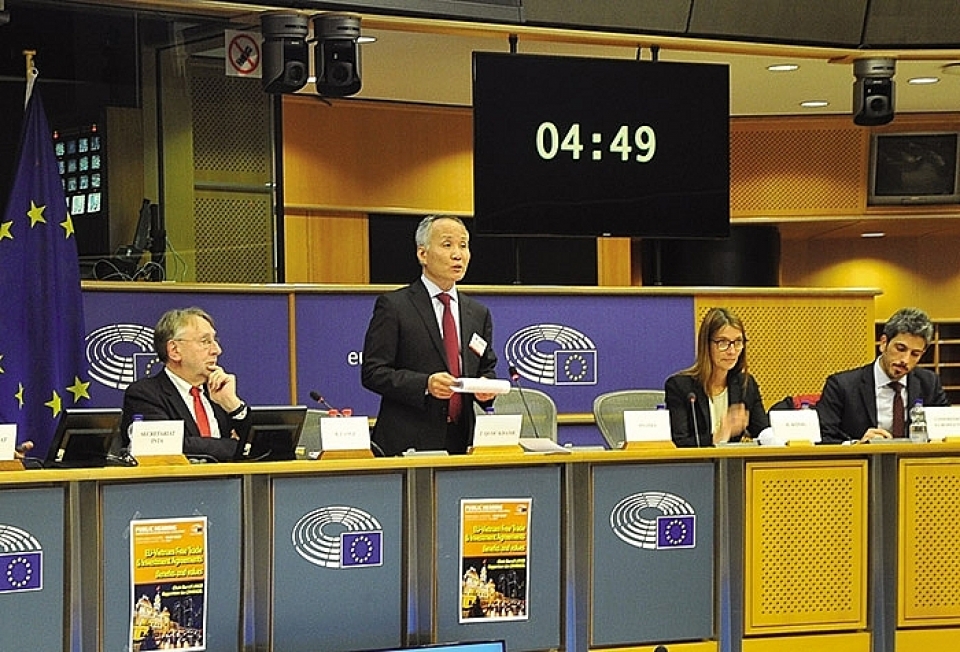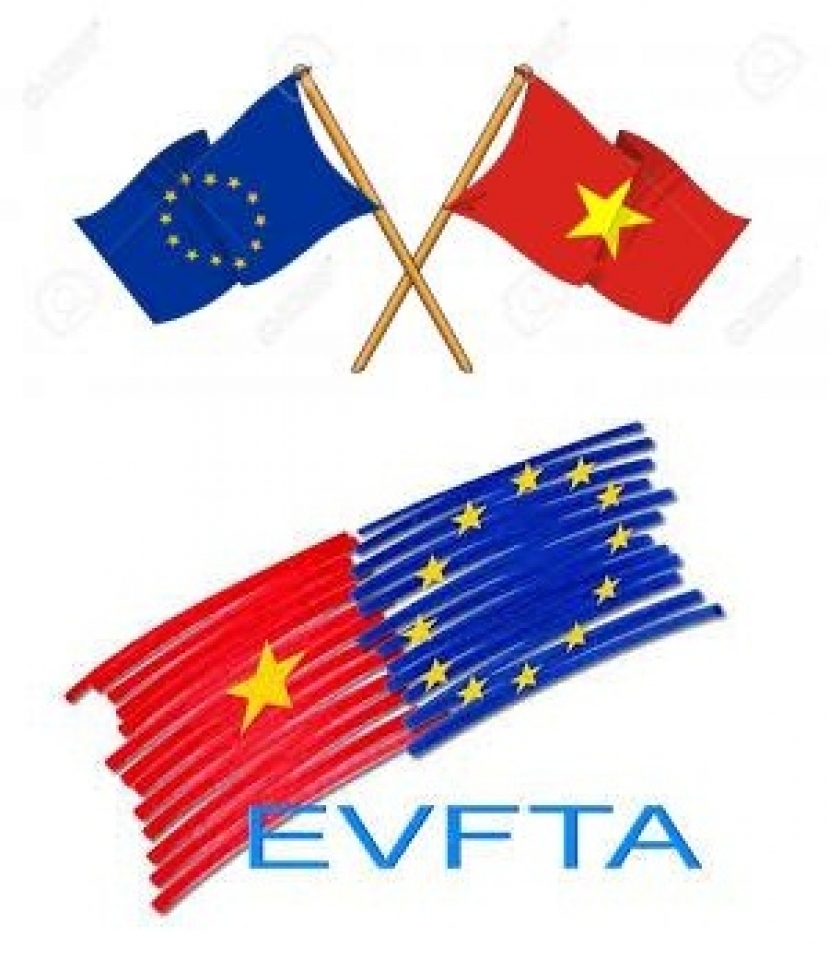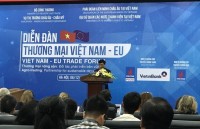
Vietnam awaits EVFTA and launch of new era
Latest
| TIN LIÊN QUAN | |
| FDI firms expand in Vietnam’s textile and garment industry | |
| EVFTA helps boost Vietnam – France economic partnership | |
Bruno Angelet, Ambassador and head of the European Union Delegation to Vietnam said that the European Council is now considering the signing of the EU-Vietnam Free Trade Agreement (EVFTA), which will then be submitted to the European Parliament for adoption.
In October 2018 the European Commission (EC) adopted the EVFTA and the EU-Vietnam Investment Protection Agreement (IPA). The two texts were then submitted to the European Council the following month for official signature.
“Now in Brussels, member states in the council are reviewing the agreement and we hope that by February or March 2019, they can endorse the deal. I am sure the deal will be signed,” Angelet confirmed. “If everything goes smoothly, EU Trade Commissioner Cecilia Malmström will come to Vietnam for the signing.”
 |
| The EVFTA was aready adopted by the European Commission, and is waiting to be signed by the European Coucil. (Photo: VIR) |
But Angelet noted that in May 2019, the European bloc will have an election for a new parliament. “The latest time the EVFTA can be ratified is in April. If the existing parliament cannot sign in April, or maybe in May or June, then the next parliament will do so.”
In addition to considering the EVFTA signing, the EU will have to push itself to adopt its bilateral FTA with Singapore signed in October 2018, its first FTA with an ASEAN nation.
Once the European Council agrees to sign, the next step will be European Parliament consent.
“In practice this means the parliament will have very little time for deliberations before the end of its current term in April 2019, which means ratification and entry into force of the EVFTA may have to wait until autumn 2019, and the IPA will take longer due to the requirement for member state ratification,” the parliament said on its website.
However, according to Vietnamese Deputy Minister of Foreign Affairs Bui Thanh Son, the Vietnamese government will continue working with the European Union to “sign and adopt the EVFTA as soon as is feasibly possible, especially before May 2019 when the EU parliament election take places.”
Great benefits
The EVFTA will eliminate virtually all tariffs on goods traded between the two sides (see below). It also includes a strong, legally-binding commitment to sustainable development, including the respect of human rights, labour rights, environmental protection and the fight against climate change, with an explicit reference to the Paris Agreement.
According to the European Parliament, the EU hopes that the FTA with Vietnam will boost trade and investment.
“The FTA is also an important stepping stone to a wider EU-Southeast Asia trade deal, something which the EU has been striving towards for nearly a decade,” the parliament said. “Vietnam, a fast-growing and competitive economy whose bilateral trade with the EU has quintupled over the past 10 years, is equally keen on the deal, which could potentially boost its GDP by 15 per cent.”
“The trade and investment agreements with Vietnam are exemplary of Europe’s trade policy. They bring unprecedented advantages and benefits for European and Vietnamese companies, workers and consumers. They take fully into account the economic differences between the two sides,” said Jean-Claude Juncker, President of the EC.
In particular, according to the EC, the EVFTA will create parity for EU companies and innovative products.
 |
| The EVFTA will eliminate virtually all tariffs on goods traded between the two sides. (Photo: Weebly) |
“The EVFTA will level the playing field between state-owned enterprises and private enterprises when state-owned enterprises are engaged in commercial activities,” said an EC document on the EVFTA. “There are also rules on transparency, and consultations on domestic subsidies. These are the most ambitious rules that Vietnam has ever agreed to in an international deal.”
On intellectual property rights, Vietnam has committed to a high level of protection going beyond standards of the World Trade Organization Trade-Related Aspects of Intellectual Property Rights agreement. With this, EU innovations, artworks and brands will be better protected against being unlawfully copied, including through stronger enforcement provisions.
The EU pharmaceutical sector in particular will benefit from improved protection of test data and from the possibility to get an extension of the term of the patent up to two years if there are delays in marketing authorisation.
Vietnam has also taken on ambitious commitments concerning the procurement of pharmaceutical products, for instance allowing companies with European capital to import and sell medicines to distributors and wholesalers within the country.
| Contents of the EU-Vietnam Free Trade Agreement The European Commission has described the EVFTA as the most ambitious free trade deal ever concluded with a developing country. It includes the following: - Near-complete removal of tariff barriers: elimination of over 99 per cent of customs duties on exports in both directions; - Reduction of non-tariff barriers: Vietnam will align more closely with international standards on motor vehicles and pharmaceuticals. As a result, EU products (which already comply with these standards) will not require additional Vietnamese testing and certification procedures. Vietnam will also simplify and standardise customs procedures; - EU access to Vietnamese public procurement: EU companies will be able to compete for Vietnamese government contracts (and vice-versa); - Improved access to Vietnamese service markets: the FTA will make it easier for EU companies to operate in the Vietnamese postal, banking, insurance, environmental and other service sectors; - Investment access and protection: Vietnamese manufacturing sectors such as food, tyres, and construction materials will open up to EU investment. The FTA establishes an investor-state tribunal to resolve disputes between EU investors and Vietnamese authorities (and vice-versa); - Promoting sustainable development: the FTA includes commitments to implement International Labour Organization core standards (for instance, on freedom to join independent trade unions — potentially a momentous change as Vietnam does not at present have any such unions) and UN conventions (for instance, on combatting climate change and protecting biodiversity). The EVFTA will remove tariffs on a range of key EU export products: - Almost all machinery and appliances will be fully tariff-free at entry into force, and the rest after seven years. Current duties are 35 per cent; - Motorcycles with engines larger than 150cc will see tariffs fully removed after seven years (current duty is 75 per cent) and cars after 10 years (down from 78 per cent); - Car parts will be duty free after seven years (current duties are 32 per cent); - Roughly half of EU pharmaceuticals exports will be duty free at entry into force and the rest after seven years (currently facing duties of 8 per cent); - All textile fabric exports will see their duties removed at entry into force (currently with a tariff of 12 per cent); - Nearly 70 per cent of EU chemicals exports will be duty free at entry into force (current duties up to 5 per cent) and the rest after three, five or, respectively, seven years (current tariffs of 25 per cent); - Wines and spirits will be fully tariff-free after seven years (down from tariffs of 50 and 48 per cent respectively)’ - Frozen pork meat will be duty free after seven years, beef after three years, dairy products after a maximum of five years and food preparations after a maximum of seven years; - Tariffs on chicken will be progressively reduced to zero in the next 10 years; - For sensitive agricultural products, the EU will not open its market up to Vietnamese imports completely. Quotas will limit the quantity that can enter the EU duty-free. This includes rice, sweet corn, garlic, mushrooms, eggs, sugar and high-sugar products, manioc starch, other modified starches, ethanol, and canned tuna. |
 | Vietnamese farm produce confidently conquering the EU market With an export growth rate of 10% annually, farm produce is currently one of Vietnam’s major exports to the European Union (EU). The Vietnam-EU Free ... |
 | Vietnam has massive potential for EU businesses: Greek diplomat Deputy Foreign Minister of Greece Terens - Nikolaos Quick on December 10 said Vietnam possesses massive potential for European Union (EU) exporters and investors to ... |
 | Forum promotes exports of agricultural products to EU The 2018 Vietnam – EU Trade Forum, themed ‘Agro-trading: Partnership for sustainable development’, was held in Ha Noi on December 6, aiming to promote exports ... |

























